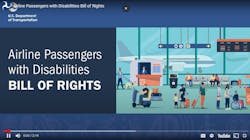DOT Launches Public Awareness Campaign to Ensure Air Travelers with Disabilities Know Their Rights
In preparation for the busy holiday travel season, and in celebration of the 37th anniversary of the Air Carrier Access Act (ACAA), the U.S. Department of Transportation (DOT) announced that it has launched a campaign, #AccessibleAirTravel, to raise awareness about the right of air travelers with disabilities to safe, dignified, and accessible air travel. An estimated 5.5 million Americans use a wheelchair, and many encounter barriers when it comes to air travel.
“Airline passengers with disabilities deserve to travel safely and with dignity,” said U.S. Transportation Secretary Pete Buttigieg. “DOT is proud to partner with the aviation industry and members of the disability community to ensure that all travelers with disabilities know their rights.”
The #AccessibleAirTravel campaign will promote DOT’s Airline Passengers with Disabilities Bill of Rights through a quick and informative video that empowers individuals with disabilities to understand and assert their right to safe, dignified, and accessible air travel. DOT is partnering with airlines, airports, ticket agents, and disability organizations in this campaign and these partners are sharing the video on their respective websites and social media channels in October.
The Bill of Rights was developed using feedback from the Air Carrier Access Act Advisory Committee, which includes representatives of passengers with disabilities, national disability organizations, U.S. and foreign air carriers, airport operators, contractor service providers, aircraft manufacturers, wheelchair manufacturers, and national organizations representing veterans with disabilities. The Bill of Rights was developed to empower air travelers with disabilities to understand their rights, and to help ensure airline personnel and their contractors uphold those rights.
The ACAA, which was enacted on October 2, 1986, prohibits discrimination against persons with disabilities in commercial air transportation. Its passage represented a watershed moment for non-discrimination in air transportation. Since the passage of the ACAA, the Department has issued many regulations to remove barriers to accessible travel by air.
In addition to the campaign announced today, DOT has taken a number of steps to improve transportation for individuals with disabilities.
- DOT has awarded billions of dollars through President Biden’s Bipartisan Infrastructure Law to modernize airport terminals and ensure they serve all passengers and workers, including adding wheelchair ramps, accessible restrooms, and more. The infrastructure law also includes the first-ever Federal program to retrofit old rail and subway stations, adding elevators, ramps, and other improvements.
- To address many of the significant barriers and challenges experienced by passengers who use wheelchairs, the Department has initiated a rulemaking proposing, among other actions, to make it an automatic violation of the Department’s ACAA regulations for airlines to mishandle a passenger’s wheelchair. This Notice of Proposed Rulemaking would also enhance training requirements for airline personnel who provide hands-on transfer assistance to passengers and handle wheelchairs.
- Last month, DOT announced that United Airlines will implement industry-leading actions that go above and beyond Federal requirements to improve the air travel experience for passengers who use wheelchairs. This action is part of an agreement with DOT that follows a lengthy investigation by the Department into a disability complaint filed against United by Engracia Figueroa.
In July 2023, DOT finalized a rule which requires airlines to make lavatories on new, single-aisle aircraft more accessible. This final rule is an outgrowth of an agreement reached by the ACCESS Advisory Committee, which included representatives of airlines, persons with disabilities, and other interested parties. Under this final rule, airlines are required to take various steps to improve the accessibility of these lavatories short of increasing their size in the short term. In addition, in the long term, airlines are required to provide an accessible lavatory that is large enough to permit a passenger with a disability and attendant, both equivalent in size to a 95th percentile male, to approach, enter, and maneuver within as necessary to use the aircraft lavatory.
- On July 11, 2023, Secretary Buttigieg delivered remarks at the White House celebrating the 33rd anniversary of the Americans with Disabilities Act and urged Congress to pass legislation allowing passengers with disabilities to pursue legal action against airlines that violate their rights.
- DOT has begun laying the groundwork for a potential rule that would allow passengers to stay in their own wheelchairs when they fly.
- DOT is working with industry, academia, and Federal partners to encourage vehicles of the future – including automated vehicles, electric vehicles, and associated charging infrastructure – to be designed inclusively.
DOT is committed to ensuring that air travel is safe and accessible and to improving the travel experience for individuals with disabilities. Air travelers who experience disability-related problems may file a complaint with the Department. The Department’s Office of Aviation Consumer Protection investigates every disability complaint that it receives.



